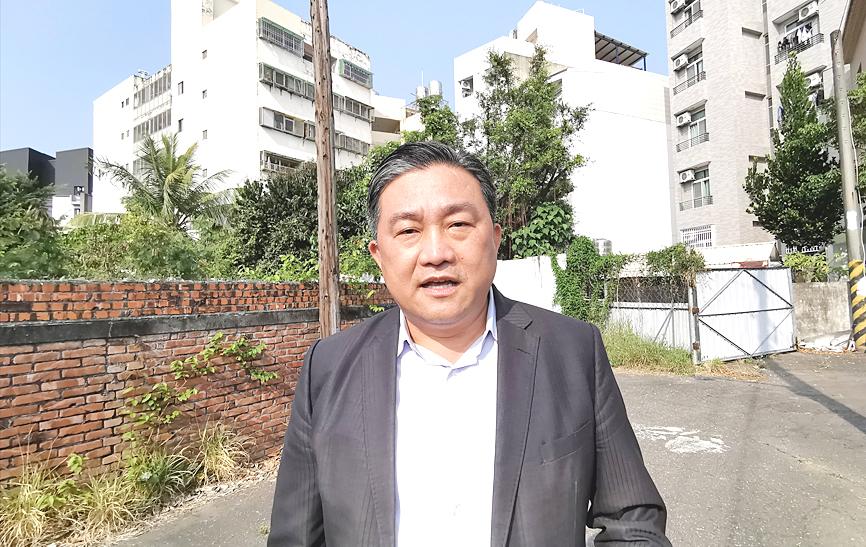National security officials have recommended criminalizing the display of the five-star People’s Republic of China (PRC) flag under social order law, as legislators deliberate an amendment that would consider the act a national security offense.
A bill proposed by Democratic Progressive Party Legislator Wang Ting-yu (王定宇) and supported by 29 other lawmakers would amend the National Security Act (國家安全法) to ban actions that damage national identity or work in favor of a hostile foreign power.
Those found guilty could be fined NT$10,000 to NT$100,000, and related articles would be confiscated.

Photo: Wu Chun-feng, Taipei Times
It would also include fines of up to NT$50,000 for “raising, lowering, hanging, displaying, holding or brandishing” any political or military flag of a hostile foreign power in public places.
However, the rules would not apply to events that have been given approval to fly such flags by a competent authority or when they are flown to accord with international convention.
The PRC flag problem has existed for a long time, but amending national security law is not the appropriate way to impose criminal liability for contraventions of “national identity,” security officials said.
They instead recommended changing the Social Order Maintenance Act (社會秩序維護法) to legislate against such acts, with fines of NT$10,000 to NT$50,000.
The National Security Act covers serious felonies, an official said, adding that it is not suitable for criminalizing the display of a flag.
If law enforcement officials have trouble determining whether something is in contravention of national security law, they could be criticized for running a police state, they said.
On the other hand, if the issue continues to be ignored, it would allow China to keep using the nation’s democratic principles for its own “united front” work, they added.
After reviewing the proposal, the official recommended applying a minor punishment.
The issue is ultimately one of social order, as seeing the PRC flag causes discomfort to many Taiwanese and could lead to violent conflict, the official said.
The National Security Council has reportedly already suggested that the Anti-infiltration Act (反滲透法) be amended to criminalize the sharing of political propaganda or misinformation under the instruction or assistance of a foreign power.

Taiwan has received more than US$70 million in royalties as of the end of last year from developing the F-16V jet as countries worldwide purchase or upgrade to this popular model, government and military officials said on Saturday. Taiwan funded the development of the F-16V jet and ended up the sole investor as other countries withdrew from the program. Now the F-16V is increasingly popular and countries must pay Taiwan a percentage in royalties when they purchase new F-16V aircraft or upgrade older F-16 models. The next five years are expected to be the peak for these royalties, with Taiwan potentially earning

STAY IN YOUR LANE: As the US and Israel attack Iran, the ministry has warned China not to overstep by including Taiwanese citizens in its evacuation orders The Ministry of Foreign Affairs (MOFA) yesterday rebuked a statement by China’s embassy in Israel that it would evacuate Taiwanese holders of Chinese travel documents from Israel amid the latter’s escalating conflict with Iran. Tensions have risen across the Middle East in the wake of US and Israeli airstrikes on Iran beginning Saturday. China subsequently issued an evacuation notice for its citizens. In a news release, the Chinese embassy in Israel said holders of “Taiwan compatriot permits (台胞證)” issued to Taiwanese nationals by Chinese authorities for travel to China — could register for evacuation to Egypt. In Taipei, the ministry yesterday said Taiwan

‘LIKE-MINDED PARTNER’: Tako van Popta said it would be inappropriate to delay signing the deal with Taiwan because of China, adding he would promote the issue Canadian senators have stressed Taiwan’s importance for international trade and expressed enthusiasm for ensuring the Taiwan-Canada trade cooperation framework agreement is implemented this year. Representative to Canada Harry Tseng (曾厚仁) in an interview with the Central News Agency (CNA) said he was increasingly uneasy about Ottawa’s delays in signing the agreement, especially as Ottawa has warmed toward Beijing. There are “no negotiations left. Not only [is it] initialed, we have three versions of the text ready: English, French and Mandarin,” Tseng said. “That tells you how close we are to the final signature.” Tseng said that he hoped Canadian Prime Minister Mark Carney

POSITIVE DEVELOPMENT: Japan and the US are expected to hold in-depth discussions on Taiwan-related issues during the meeting next month, Japanese sources said The holding of a Japan-US leaders’ meeting ahead of US President Donald Trump’s visit to China is positive news for Taiwan, former Japan-Taiwan Exchange Association representative Hiroyasu Izumi said yesterday. After the Liberal Democratic Party’s landslide victory in Japan’s House of Representatives election, Japanese Prime Minister Sanae Takaichi is scheduled to visit the US next month, where she is to meet with Trump ahead of the US president’s planned visit to China from March 31 to April 2 for a meeting with Chinese President Xi Jinping (習近平). Japan and the US are expected to hold in-depth discussions on Taiwan-related issues during the